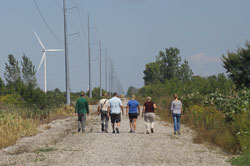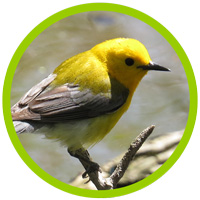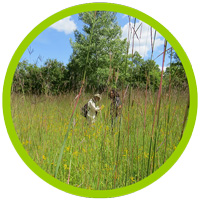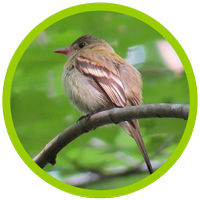From Landowners, to municipalities, to First Nations communities and beyond, Carolinian Canada's flagship Ecosystem Recovery Program continues to green the future with over 150 partners.
Talking about Healthy Ecosystems
One of the year’s highlights was our 2015 Ecosystem Recovery Forum, hosted by the Chippewas of the Thames. Representatives from eight First Nations showcased their efforts to protect and recover species at risk at the event, which was attended by over 130 people from across southern Ontario.
Landowner Leaders Community Grows
Thanks largely to the generous support of Environment Canada in 2015-16, Carolinian Canada’s Landowner Leaders Program helped ten new private landowners develop Carolinian Habitat Action Plans (CHAPs) for their properties in Chatham-Kent, Elgin, Lambton and Middlesex counties. These CHAPs include measures to protect and restore over 148 hectares of habitat for 63 different species at risk! We now have 16 full-fledged Landowner Leaders and a sizable waiting list for the popular program. Here’s one of the many positive comments we’ve received from our cherished landowners:
“We enjoyed…putting some serious thought into our landowner plans…Spring is bursting forth as I write this, our barn swallows are back and we are grateful for living in this beautiful part of Canada. Together we can make a difference!”
 Conservation Action Plans and EcoTrails make Connections
Conservation Action Plans and EcoTrails make Connections
The Rouge Valley Signature Site Conservation Action Plan was completed in collaboration with eight local groups. A public launch is anticipated at our 2016 Ecosystem Recovery Forum in Toronto. We and our partners have now completed CAPs for all 17 biodiversity hotspots in the ecoregion!
As part of Carolinian Canada’s contribution to implementing Conservation Action Plans in Chatham-Kent, we completed a detailed life science inventory, restoration plan, invasive species plan and outreach plan for the Canada South EcoTrail. The decommissioned rail corridor spans the breadth of the large municipality and provides amazing opportunities for recreation, nature appreciation and habitat restoration. Fourth-year Western University students helped research aspects of the restoration plan through their Community Engaged Learning program.
Healthy habitat actions were promoted through the Carolinian EcoTrail Network in Essex and Middlesex. Leamington Monarch EcoTrail joined our EcoTrail Network in early 2016! The Dorchester Mill Pond EcoTail launched a Frog and Turtle revitalization program with support of the Municipality of Thames Centre and Northdale Public School students who created a large trail sign. This year, we launched a new EcoTrail Network website where you can explore partner trails, share EcoTrail stories and grow wild by taking action to green the future in your community.
Big Picture Services come to First Nations Communities
Through our Big Picture Services initiative, we conducted species at risk inventories at Chippewas of the Thames and at Kettle and Stony Point First Nations. Highlights included the discovery of endangered Prothonotary Warblers and Acadian Flycatchers, and many other rare species and habitats on well cared-for First Nation lands.



Prothonotary Warbler, Acadian Flycatcher, and Fieldwork at Chippewas of the Thames. Photos: Jarmo Jalava
Ecosystem Outreach goes International
Our Big Picture messages to restore healthy functioning ecosystems in Canada’s “Deep South” reached over 250,000 people via television, radio and social media. We gave presentations and workshops to many hundreds of stakeholders (practitioners, landowners and youth) across the Zone, as well as internationally at NatureServe’s Biodiversity Without Borders conference in Michigan.
Our Ecosystem Recovery Program informs all aspects of Carolinian Canada's work. See more highlights in the Big Picture and how it helped raise $3,000 in Members.
It’s amazing what can be accomplished on a shoe-string!
